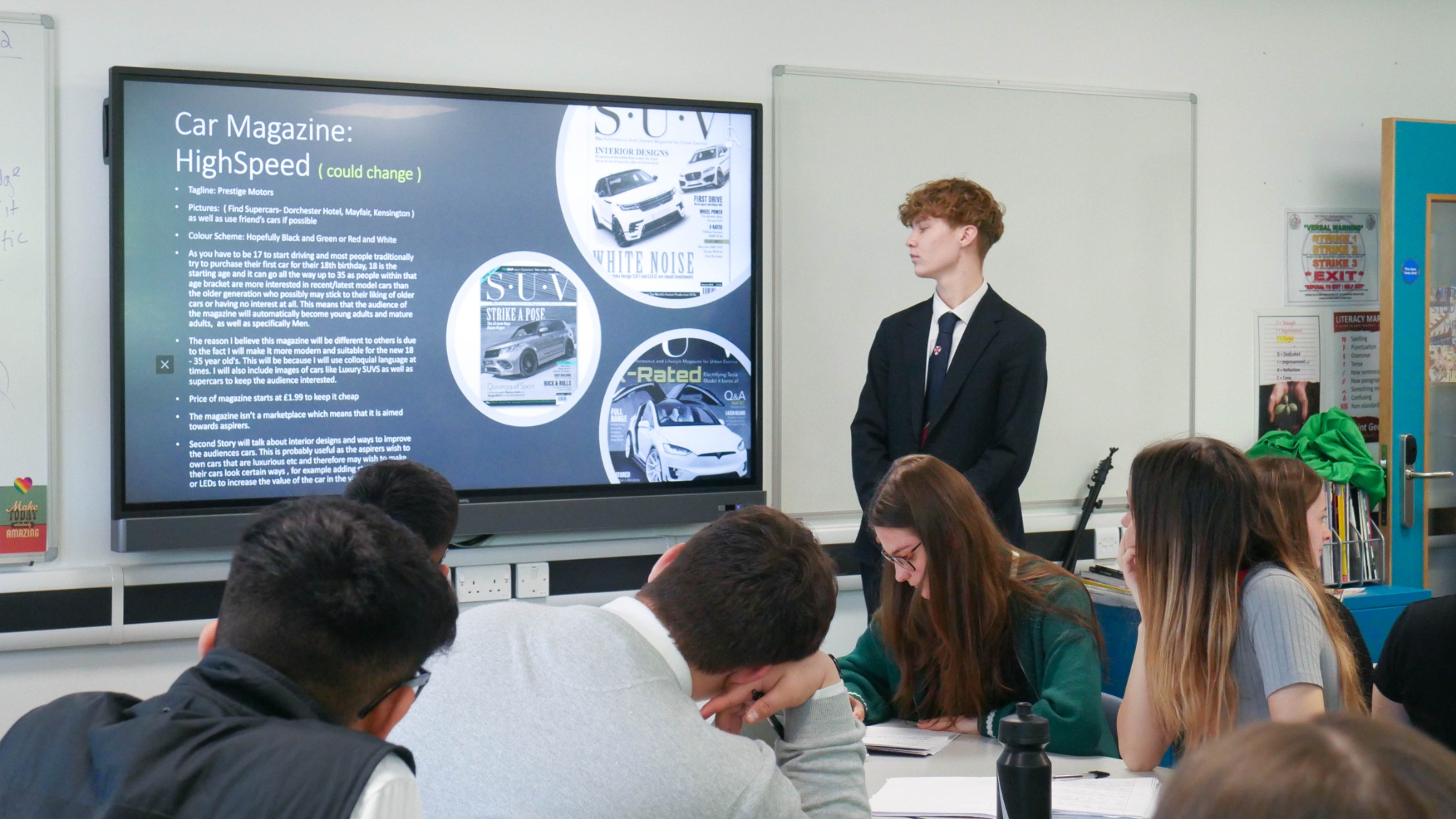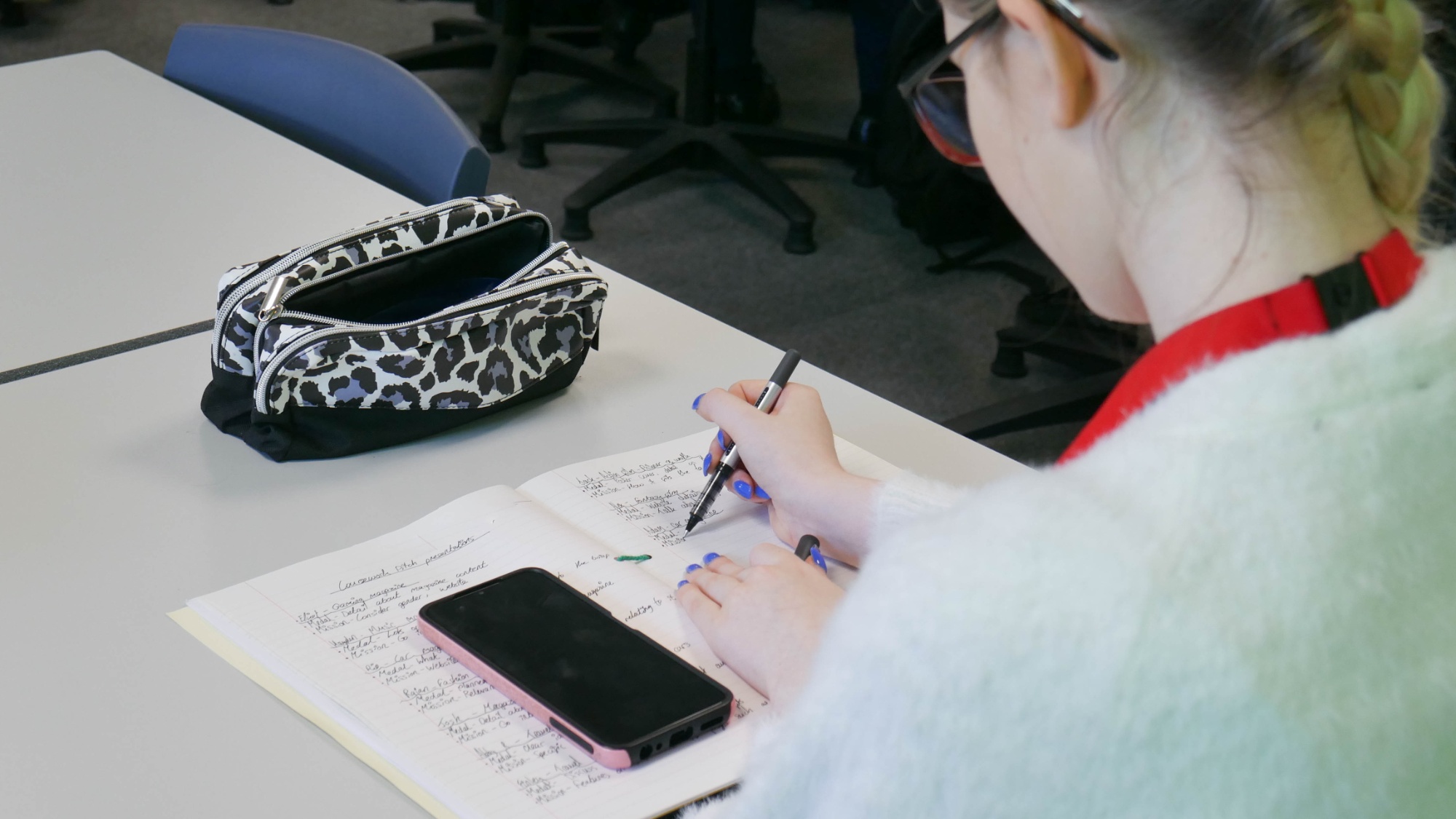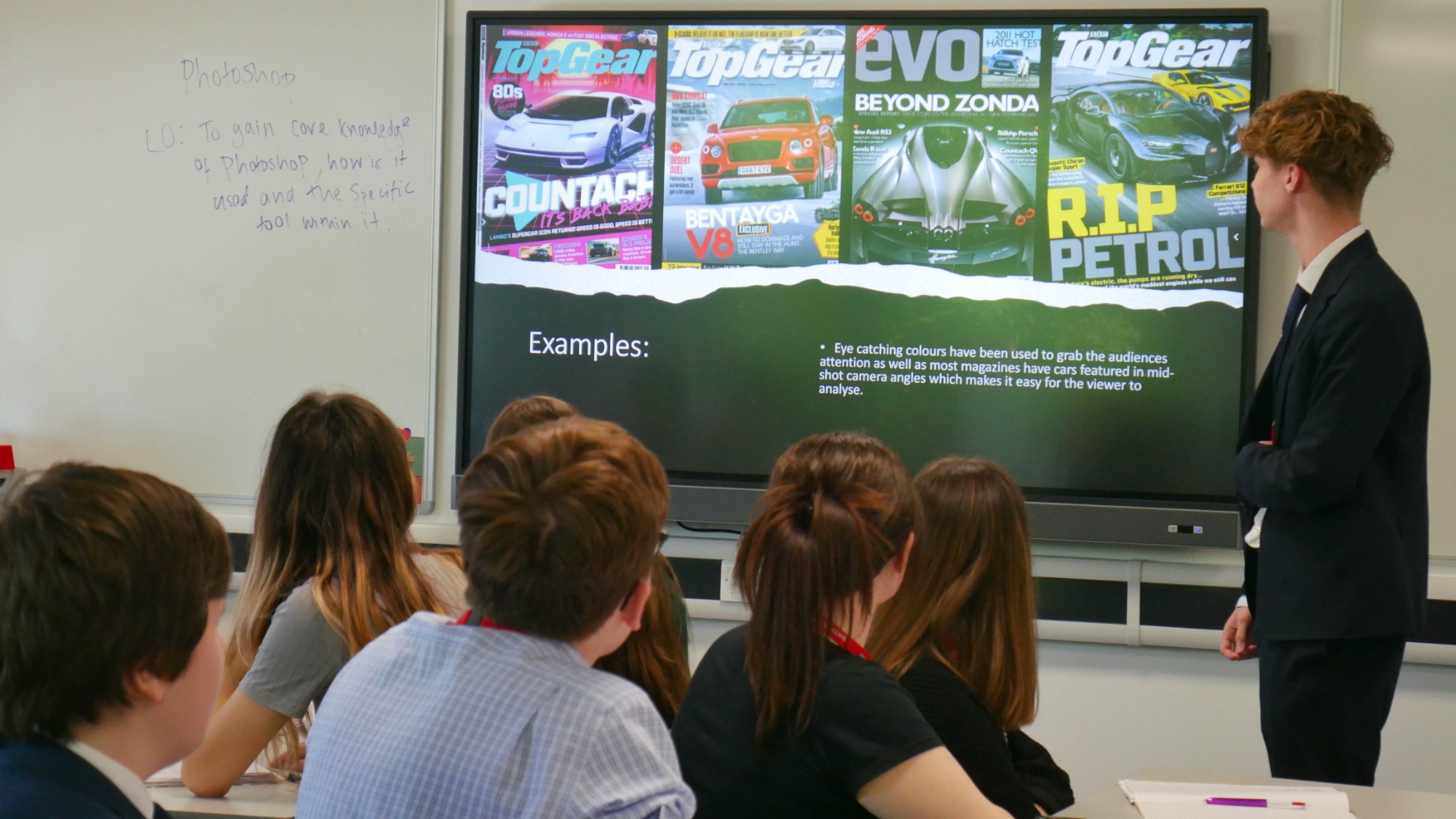Media Studies
Curriculum Leader: Mr J Bulger - bulgerj@saintgeorgescofe.kent.sch.uk
A Level Media Studies is centred around the analysis of set texts from advertising, film promotion, music, newspapers, magazines and television. The media course is centred around the key concepts of media language, media representation, media industries and media audiences.
Subject Requirements
- If students completed GCSE Media Studies: GCSE Media Studies - Grade 5 or above and GCSE English - Grade 4 or above
- If students did not complete GCSE Media Studies: GCSE English - Grade 5 or above
Intent
The intent for A-Level Media is to build students' understanding of key concepts of studying the media, such as subject terminology, analysis skills, and understanding of theory and contexts. A-Level has a particular emphasis on theoretical frameworks and there are many theories to learn and apply at different parts of the course.
Initially, the focus is on developing an understanding of the theory, before aiding the students to apply the theoretical frameworks to both set (studied) texts and unseen texts, meaning that independent analysis and comparative skills are heavily important at KS5.
Media Studies is an excellent way to build students' cultural capital due to the diverse range of platforms and texts they will study.

Implementation

The course structure is ordered to gradually build students’ knowledge and skills, developing these from one unit to the next, students will develop the most familiar skills first, as not all A-Level Media students have necessarily studied GCSE media also.
Students will work on academic and written communication, as the main means of assessment, through writing structures, modelling, and peer feedback.
We ensure that SEND and disadvantaged children are given the necessary support in class to access the Curriculum fully and that equal opportunities are given to all.
Impact
Students will have studied a diverse range of platforms and developed a wide range of skills for classroom practice and summative assessment.
Transferable skills, cultural capital, and verbal and written expression will have been developed in a way to benefit students who will seek opportunities within creative industries, and enhance the opportunities for those who develop futures in other areas.

Topics
Year 12 Media Studies Topic Information
In year 12, students will complete Component 1: Media Products, Industries and Audiences.
In this component, learners will develop knowledge and understanding of key aspects of the theoretical framework - media language and representation – as an essential basis for analysing media products from a variety of forms. In addition, learners will study products from specific media industries and for specific audiences to develop their knowledge and understanding of those areas of the theoretical framework. Learners will also explore how media products relate to their social, cultural, historical, political and economic contexts. In this component, learners will develop their ability to use relevant subject-specific terminology and theories.
The following media forms will be studied:
- Newspapers (Sections A and B)
- Advertising and Film posters (Sections A and B)
- Music Videos (Section A)
- Radio (Section B)
- Video Games (Section B)
- Film Industry (Section B)
Students will also begin Component 3: Coursework Research and Planning
Year 13 Media Studies Topic Information
In year 13, students will complete Component 2: Media Forms and Products in Depth.
In this component learners are required to study three media forms in depth, exploring all areas of the theoretical framework - media language, representation, media industries, and audiences - in relation to audiovisual, print and online products set by WJEC.The following media forms will be studied:
- Television
- Magazines
- Online media (Influencers)
Learners will explore these three media forms through close analysis of the set products, comparing their use of media language and the representations they offer in relation to relevant social, cultural, economic, political and historical contexts. Learners will study the role of media industries in shaping media products, as well as considering the way in which both mass and specialised audiences are targeted and addressed. Relevant and advanced theories will inform study of the set products and learners will reflect critically upon these theoretical perspectives. Learners should continue to develop their ability to use relevant subject-specific terminology in this component.
Students will also complete Component 3: Cross-Media Production
This component synthesises knowledge and understanding of the media theoretical framework gained throughout their course by requiring learners to apply their knowledge and understanding of the media synoptically to practical production. In Components 1 and 2, learners gain a detailed understanding of the theoretical framework in relation to a range of media forms. In this component, learners are required to apply their knowledge and understanding of media language, representation, audiences, media industries and the digitally convergent nature of the media in an individual production for an intended audience. The production must be based on two media forms and completed in response to a choice of briefs set by WJEC.
Assessments
Two written exams (70%) and one piece of non-exam assessment (an original piece of coursework) (30%)
| Component 1: Media Products, Industries and Audiences (35%). | Component 2: Media Forms and Products in Depth (35%) | Component 3: Cross-Media Production (30%). |
|---|---|---|
| 2 Hours 15 minutes. 90 Marks. | 2 Hours and 30 minutes. 90 Marks. | Non-exam assessment. 60 Marks. |
|
|
|
Examining board link: Eduqas A Level Media Studies
Media Studies Future Paths
Higher education degree courses in a range of creative subjects such as marketing, advertising, communications, PR, Film/TV studies and production, games design, website and social media management etc.
Career paths such as marketing and advertising, social media management, designer, website building, YouTube, and professional production
You will develop critical analysis, evaluation and communication skills, business acumen and how to define demographics, which are transferrable to many different career paths and futures.
For more information on Careers, please visit here.
Extra Resources
Students on GCSE and A-Level Media are given access to the ‘eRevision’ website when they enrol on the course – this has a range of quizzes and interactive activities which are also used as homework
